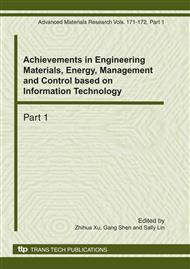p.504
p.508
p.512
p.518
p.523
p.527
p.531
p.536
p.543
To Design an Effective E-Learning System in the Civil Servants' Job-Training
Abstract:
The Chinese government is pursuing e-learning policies which makes job-training with a knowledge-based society. To explain more fully the important role of the e-learning environment, this article undertakes some typical examples of the governments' job-training under e-learning environment. The main problems in servants' job-training in China are the low quantity in the servants' training, short of restriction, the uniform manner in the training and less fairness and availability of opportunities for educational training. In order to develop the e-learning system, the civil servant's job training policies are provided and the measures of the effective e-learning system are designed.
Info:
Periodical:
Pages:
523-526
Citation:
Online since:
December 2010
Authors:
Keywords:
Price:
Сopyright:
© 2011 Trans Tech Publications Ltd. All Rights Reserved
Share:
Citation:


